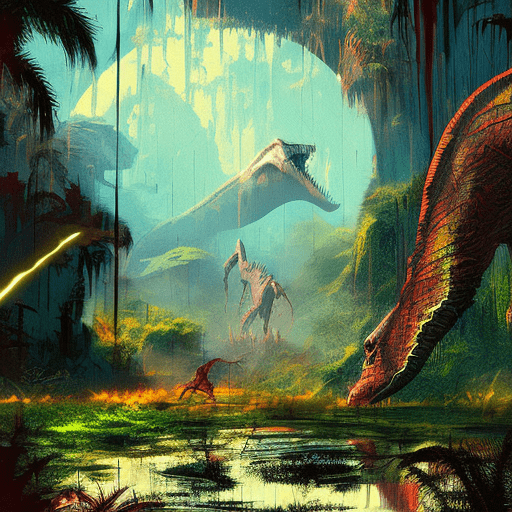One-line summary:
Jurassic Park is a thrilling science fiction novel that explores the disastrous consequences of resurrecting dinosaurs through genetic engineering.
Introduction:
Jurassic Park, written by Michael Crichton and published in 1990, takes readers on a thrilling adventure to a remote island where dinosaurs have been brought back to life through genetic engineering. As the story unfolds, chaos ensues, highlighting the dangers of playing with nature and the potential consequences of tampering with genetic codes. With its fast-paced narrative and thought-provoking themes, Jurassic Park has become a beloved classic in the science fiction genre.
The Creation of Jurassic Park:
In Jurassic Park, billionaire John Hammond creates a theme park on Isla Nublar, a remote island off the coast of Costa Rica. Using advanced genetic engineering techniques, Hammond and his team successfully clone dinosaurs from preserved DNA found in amber-encased mosquitoes. The park is intended to be a tourist attraction, showcasing these prehistoric creatures in a controlled environment. However, as the park’s opening approaches, concerns about safety and the ethical implications of resurrecting extinct species arise.
The Illusion of Control:
Despite the park’s elaborate security measures, chaos quickly ensues when the dinosaurs break free from their enclosures. The scientists and visitors find themselves in a fight for survival as the once-controlled environment turns into a deadly battleground. The illusion of control that Hammond and his team believed they had over the dinosaurs is shattered, revealing the inherent unpredictability of nature and the dangers of tampering with it.
The Ethical Dilemma:
Jurassic Park raises important ethical questions about the limits of scientific progress and the consequences of playing god. By bringing extinct creatures back to life, the scientists in the novel challenge the natural order and disrupt the delicate balance of ecosystems. The novel serves as a cautionary tale, warning against the potential dangers of unchecked scientific advancements and the importance of considering the ethical implications of our actions.
Key Takeaways:
- Scientific progress should be accompanied by careful consideration of ethical implications.
- Nature is unpredictable and cannot be fully controlled.
- Playing with genetic codes can have disastrous consequences.
- Resurrecting extinct species disrupts the natural balance of ecosystems.
- Unchecked scientific advancements can lead to unintended chaos and destruction.
Memorable Quote:
“Life finds a way.” – Dr. Ian Malcolm
In conclusion, Jurassic Park is a thrilling and thought-provoking novel that explores the dangers of tampering with nature and the ethical implications of scientific advancements. As chaos erupts on the island, the characters are forced to confront the consequences of their actions and the limits of human control. Through its gripping narrative and cautionary themes, Jurassic Park reminds us of the importance of respecting the natural world and considering the potential consequences of our scientific pursuits.












